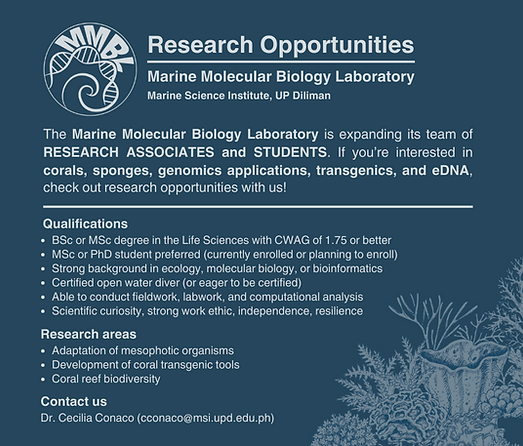ABOUT THE MMBL
Within the ocean thrives a diversity of life uniquely adapted to the challenges of a dynamic, and sometimes extreme, environment. Our research interest lies in exploring the genomic complement of marine organisms to reveal the keys to their success in various ecological niches, as well as to gain insight into the origin and evolution of animal diversity and complexity.
We apply next-generation sequencing and techniques in molecular biology to elucidate gene composition, expression dynamics, and the regulatory networks that control different aspects of marine life, such as developmental transitions and responses to changing ocean conditions.
The Marine Molecular Biology Laboratory is part of the Marine Science Institute of the University of the Philippines in Diliman. Many of our experiments are conducted at the Bolinao Marine Laboratory in Bolinao, Pangasinan. We welcome collaborations with students and experts from diverse fields.


Explore research
opportunities with us
RESEARCH INTERESTS

Gene expression dynamics
Organismal responses to stress
Transcriptome dynamics
Regulatory mechanisms

Evolution and development
Larval development
Comparative gene expression
Genome evolution
Early nervous system evolution

Marine symbiosis
Symbiosis and resilience
Holobiont interactions
Microbial community diversity
ONGOING PROJECTS

Developing transgenic corals as a novel technology for reef restoration
This project aims to develop gene promoters that may be used to drive expression of beneficial gene products that could confer tolerance to heat, disease, or other stressors. Funded by CORDAP. In partnership with UNCW.

ClimateReefs: Integrating risks, evolution, and socio-economics for fisheries sustainability on coral reefs in a changing cclimate
This project aims to test how reef geomorphology and thermal regime predict biodiversity and adaptive capacity, and to understand how gender and social status shape socio-economic vulnerabilities and ability to adapt to reef degradation. Funded by IDRC. In partnership with University of Leeds, University of Pattimura, and Rare.

Coral resilience and adaptation (Part of the Regional Coral Restoration Networks in the Philippines and Australia Project)
This project aims to enhance survival of coral larvae and recruits by selective breeding from heat-tolerant broodstock and co-culture of heat-tolerant microalgal photosymbionts. Funded by ACIAR

Investigating the genetic basis of adaptive capacity in mesophotic organisms (Part of the Mesophotic Coral Ecosystems Program)
This project aims to provide a global view of genetic changes in the holobiont that underlie adaptation to mesophotic habitats. Funded by DOST-PCAARRD